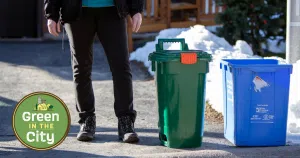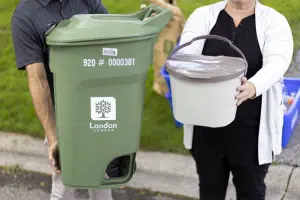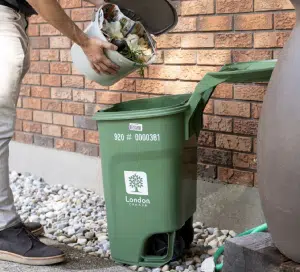London has completed one year of the Green Bin program, successfully tackling food waste and promoting community involvement. In a recent webinar, Jay Stanford, Director of Environmental Programs and Solid Waste, highlighted the program’s achievements and challenges, emphasizing its role in fostering sustainable practices.
“The green bin program is something municipalities are required to implement. London was a latecomer in this area,” Stanford explained. “Many municipalities began their programs over ten years ago, so we had to catch up. However, there are positive reasons for bringing this initiative to London—creating local jobs, reducing greenhouse gases, and addressing food waste, all while meeting provincial requirements.”
A key focus of the program has been to tackle avoidable food waste. Stanford noted its financial impact, stating, “We estimated that the cost of avoidable food waste sent to the landfill is around $100 million, approaching $120 million. A 10% reduction in this waste could save Londoners between $10 to $12 million per year. That’s money that could remain in your pocket while also contributing to efforts in climate action and greenhouse gas reductions.”
Participation rates have been encouraging, with around 60% of households in London joining the program. “When we compare our participation rate to other communities in Ontario, we see that they range from 41% to 69% on average. It’s interesting to note that those communities have been actively participating for five to ten years, while we have been at it for only one year,” Stanford remarked. This success demonstrates the community’s commitment to reducing landfill waste and adopting sustainable practices.
The program has received mixed feedback from residents. Many appreciate the city’s efforts to reduce food waste and promote sustainable practices. However, some residents have found the transition to biweekly garbage collection to be challenging. This highlights the need for ongoing communication and support to address concerns and improve participation.
Future and Expansion
Looking ahead, the city plans to expand the program to multi-residential buildings and is exploring the inclusion of pet waste and other items in the green bin system. “Pet waste is an item that many green bin communities have added in recent years, and it’s something we’re closely evaluating,” Stanford shared.
Additionally, the city continues to monitor and improve the program, relying on feedback from thousands of residents.
Stanford concluded with a call to action “Please help inspire others to reach the level you’ve achieved in the system. We’ve set the bar after one year, but there’s more work to do.”
The first year of the Green Bin program is a significant advancement for London’s waste management efforts. As the city celebrates this milestone, it remains committed to overcoming challenges and fostering a more sustainable future.







